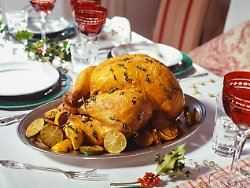Wednesday, October 06, 2021
Provision for Christmas roast
Brits pounce on frozen turkey
Butchers in Great Britain are sounding the alarm: there is a shortage of workers and the traditional Christmas roast could be tight. Apparently that’s why the British prefer to play it safe. The sales of frozen turkeys have been increasing rapidly since the bad news.
Given the recent supply problems in the UK, retail chain Tesco expects increased demand for frozen turkeys, a popular Christmas dinner. “We are currently seeing a ten percent increase in turkey, and there is a noticeable increase in demand for frozen turkeys,” said Tesco CEO Ken Murphy. Although some delivery problems cannot be ruled out, supply chains and stockpiling are currently working well. It also contributed to the fact that the company reduced the selection a little on some products, such as pasta, in order to reduce pressure on the supply chains.
According to its own information, Tesco has already hired 15,000 additional workers for the Christmas business, while its competitor Morrisons has 3,000, and Sainsbury’s plans to temporarily recruit 22,000 people. Above all, a blatant shortage of truck drivers, but also of butchers, keeps gaps on the shelves in Great Britain. One reason is that strict immigration rules have been restricting the influx of skilled workers since Brexit. Several industries therefore recently warned of bottlenecks at Christmas.
Slaughterhouses report staff shortages
According to a report in The Times, the meat industry is currently short of 15,000 workers. And there is growing concern that there will be too few ready-to-cook turkeys and ham at Christmas. A spokesman for the association of the meat processing industry told the newspaper last week that the industry had only been able to deliver “basic products” to the supermarkets because of the labor shortage. “We really should have started preparations for the Christmas production in June or July. But that has not been the case so far.” The spokesman warned of bottlenecks, for example with ham and sausages at the festival.
However, the delivery worries did not affect the Tesco figures in the first half of 2021 – on the contrary. When presenting preliminary results, the market leader emphasized that it had far outperformed its competitors. However, Tesco admitted that sales, which had increased significantly in the first six months, could decline again. Revenues increased by 5.9 percent to 30.4 billion pounds (35.8 billion euros) compared to the same period in the previous year. The operating profit (EBIT) jumped 29.5 percent to 1.3 billion pounds.
